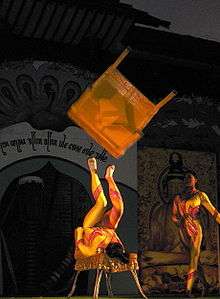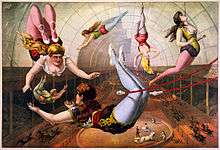Risley (circus act)

A Risley or Risley act (also antipode or antipodism) is any circus acrobalance posture where the base is lying down on their back, supporting one or more flyers with their hands, feet and/or other parts of the body; spinning a person or object using only one's feet.
The act is named after Richard Risley Carlisle (1814–1874) who developed this kind of act in the United States.[1]
Risleys can be separated into three general categories of skills:
- Skills that are based with the hands
- Skills that are based with the feet
- Other
Risley skills
- Easy Chair
- Front Hang
- Back Hang
- Foot-to-Foot stand
- Hand-to-Foot stand
- Jackknife
- Horizontal
- Shoulder Stand (aka Candlestick)
- Modified Shoulder Stand (hands on arms)
See also
References
- ↑ "Risley act", Merriam-Webster.com. (subscription required)
This article is issued from
Wikipedia.
The text is licensed under Creative Commons - Attribution - Sharealike.
Additional terms may apply for the media files.
